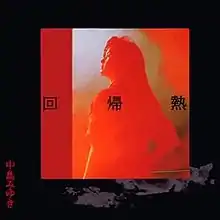Kaikinetsu
Kaikinetsu (回帰熱, "Recurrent Fever") is the 17th studio album by Japanese singer-songwriter Miyuki Nakajima, released in November 1989. Like some of her previous efforts (Okaerinasai and Oiro Naoshi), it comprises the materials that she wrote for other singers.
| Kaikinetsu | ||||
|---|---|---|---|---|
 | ||||
| Studio album by | ||||
| Released | November 15, 1989 | |||
| Recorded | Burnish Stone, Epicurus, Music Inn, Sound Valley (Tokyo, Japan) | |||
| Genre | folk rock, pop, kayokyoku | |||
| Length | 48:30 | |||
| Language | Japanese | |||
| Label | Pony Canyon/AARD-VARK, Yamaha Music Communications | |||
| Producer | Ichizō Seo, Miyuki Nakajima | |||
| Miyuki Nakajima chronology | ||||
| ||||
The album features three top-ten hit singles. Among them, "Haru Nanoni" was recorded by pop idol Yoshie Kashiwabara in 1983. It became Kashiwabara's most successful single after her breakthrough "Hello Goodbye", peaking at No. 6 on the Japanese Oricon chart.[1] Nakajima's contribution won the 25th Japan Record Awards for the "Best Songwriting Prize".[2] "Lonely Canary" is one of Kashiwabara's subsequent materials written by Nakajima, released in 1985 and charted at No. 9.[1] The lead-off track, "Kōsa ni Fukarete," was recorded by Shizuka Kudō and released as a single 2 months before Kaikinetsu came out. Nakajima had previously contributed the lyrics for her records, including two chart toppers "Fu-Ji-Tsu" and "Mu-Go,n...Iroppoi". "Kōsa ni Fukarete" also reached the summit of the Oricon shortly after its release, becoming the fifth of Kudo's eight consecutive No. 1 hit singles.[3] In Japan, it became one of the biggest hits of 1989 with sales of over 580,000 copies, winning the 4th RIAJ Gold Disc Awards for "The Best Five Singles of Year" category.[4][5]
Following the smash hit single interpreted by Kudo, Kaikinetsu sold better than other Nakajima's albums released in the late 1980s. On the Japanese Oricon Year-end chart of 1990, it was placed at the 99th best-selling album.[6]
Track listing
All songs arranged by Ichizō Seo
| No. | Title | Writer(s) | Original performer (release year) | Length |
|---|---|---|---|---|
| 1. | "Kōsa ni Fukarete (黄砂に吹かれて)" | Miyuki Nakajima, Tsugutoshi Gotō | Shizuka Kudō (1989) | 5:51 |
| 2. | "Katahaba no Mirai (肩幅の未来)" | Nakajima, Kyōhei Tsutsumi | Yōko Nagayama (1989) | 5:18 |
| 3. | "Ari, ka (あり、か)" | Nakajima | Ichiro Tanaka and Yoshihiro Kai (1988) | 5:45 |
| 4. | "Gunshū (群衆)" | Nakajima, Goto | Shizuka Kudo (1988) | 5:46 |
| 5. | "Lonely Canary (ロンリー・カナリア, Ronrī Kanaria)" | Nakajima | Yoshie Kashiwabara (1985) | 5:01 |
| 6. | "Kurayami Otome (くらやみ乙女)" | Nakajima | Reiko Sada (1989) | 4:45 |
| 7. | "Ceremony (儀式 (セレモニー), Seremonī)" | Nakajima | Noriko Matsumoto (1986) | 4:46 |
| 8. | "Mikansei (未完成)" | Nakajima | Hiroko Yakushimaru (1987) | 6:15 |
| 9. | "Even in the Spring (春なのに, Haru Nanoni)" | Nakajima | Yoshie Kashiwabara (1983) | 5:04 |
Personnel
- Hideo Yamaki – drums
- Eiji Shimamura – drums
- Jun Aoyama – drums
- Yūichi Tokashiki – drums
- Chiharu Mikuzuki – bass guitar
- Kenji Takamizu – bass guitar
- Tsugutoshi Goto – bass guitar
- Yasuo Arakawa – wood bass
- Tsuyoshi Kon – electric guitar
- Masaki Matsubara – electric guitar
- Hideo Saito – electric guitar
- Ryōmei Shirai – electric guitar
- Kiyoshi Sugimoto – electric guitar
- Chuei Yoshikawa – acoustic guitar, flat mandolin
- Nobuo Kurata – keyboards
- Yasuharu Nakanishi – keyboards
- Ken Shima – keyboards
- Elton Nagata – keyboards
- Hideo Ichikawa – keyboards
- Yasuhiro Kobayashi – accordion
- Aska Group – strings
- Joe Group – strings
- Sakurako Shirahama – violin
- Kouzou Noguchi – bassoon
- Masashi Togame – clarinet
- Toshihiko Furumura – alto sax
- Nobuhiko Nakayama – computer programming
- Tatsuhiko Mori – computer programming
- Keishi Urata – computer programming
- Yuiko Tsubokura – backing vocals
- Kazuyo Sugimoto – backing vocals
- Ichizō Seo – backing vocals, keyboards, computer programming
- Miyuki Nakajima – lead and backing vocals
Chart positions
| Chart (1989/90) | Position | Weeks | Sales |
|---|---|---|---|
| Japanese Oricon Weekly Albums Chart (top 100)[7] | 2 | 11 | 210,000+ |
References
- "Yamachan Land (Japanese Chart Archives) – Singles Chart Daijiten – Yoshie Kashiwabara" (in Japanese). Original Confidence. December 30, 2007. Archived from s-柏原芳恵 the original Check
|url=value (help) on October 16, 2007. Retrieved January 1, 2011. - "Japan Composer's Association – History of the Japan Record Awards – List of the 25th Award Winners" (in Japanese). Archived from 第25回日本レコード大賞 the original Check
|url=value (help) on February 13, 2012. Retrieved January 1, 2011. - 1989年09月第3週の邦楽シングルランキング情報 "Search results of the Japanese Oricon Weekly Singles Chart – 3rd week of September 1989" Check
|url=value (help). oricon.co.jp (in Japanese). Oricon. Retrieved December 23, 2010. - 音楽を語ろう特集 音楽を語ろう特集『中島みゆきが詞・曲を提供!工藤静香の名曲を語ろう』 Check
|url=value (help). oricon.co.jp (in Japanese). Oricon Style. Retrieved December 23, 2010. - "Recording Industry Association of Japan – List of the 4th Gold Disc Award Winners" (in Japanese). January 1, 2011. Archived from 第4回日本ゴールドディスク大賞 the original Check
|url=value (help) on November 10, 2007. - "Oricon Year-end Albums Chart of 1990" (in Japanese). Archived from 1990年 アルバム年間TOP100 the original Check
|url=value (help) on March 31, 2019. Retrieved January 1, 2011. - "Yamachan Land (Japanese Chart Archives) – Albums Chart Daijiten – Miyuki Nakajima" (in Japanese). Original Confidence. December 30, 2007. Archived from a-中島みゆき the original Check
|url=value (help) on June 19, 2007. Retrieved January 1, 2011.
